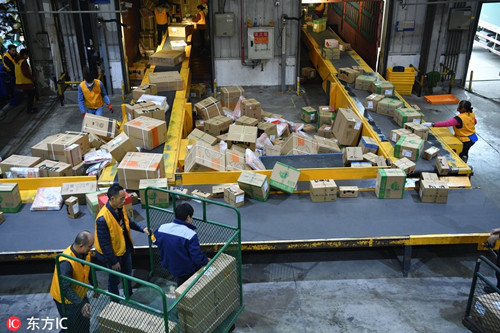Eased cap set for cross-border e-commerce


Chinese workers deal with parcels at a local distribution center in Chengdu, Southwest China's Sichuan province, on Nov 2018. [Photo/IC]
China will further encourage cross-border e-commerce transactions by easing the annual cap on transborder online purchases and adding categories of imports to the duty-free list, the Ministry of Finance announced on Friday.
Starting next year, the annual duty-free quota for crossborder e-commerce purchases for individual buyers will be lifted to 26,000 yuan ($3,745) from the current 20,000 yuan. The cap might be further eased in the future, as local residents' income grows, the ministry said in a statement.
The tax-free limits on single transactions will increase to 5,000 yuan from 2,000.
The ministry also added 63 product categories to the list of duty-free goods that might be available on cross-border e-commerce platforms. Most of these are popular high-end consumer products, such as sparkling wine, beer made from malt and fitness equipment.
The taxation-easing measures are expected to further boost the country's cross-border e-commerce, better meeting local residents' demand for high-quality foreign products and maintaining a level playing field in the local market.
Also, they will help local enterprises further push forward industrial upgrading by introducing competition from foreign counterparts.
According to the Ministry of Commerce, retail imports via e-commerce platforms rose by 53.7 percent year-on-year to 67.2 billion yuan in the first 10 months of this year.
The new policy is set to guide the sector to move toward the mid-to high-end niche, according to Cao Lei, director of the China E-Commerce Research Center.
"It propels different e-commerce players to really build up their respective strengths and tighten their grip on resources integration from procurement, logistics, customs and sales … to provide genuine, end-to-end quality service," he said.
Ouyang Cheng, director of the Alibaba Cross-Border E-Commerce Research Center, said the new policy will promote innovative and sustainable development of China's e-commerce industry.
Zhang Lei, CEO of NetEase Kaola, a leading Chinese crossborder portal, said, "This is a strategic commitment to the industry as a whole and is conducive to driving consumption upgrade and advancing economic growth."
The increased transaction value cap will not only unlock consumption potential and encourage spending on items like affordable luxury goods, electronics and beauty care, but will further adjust and optimize cross-border e-commerce categories, she said.
Liu Peng, general manager of Tmall Import & Export, said: "We see continued stability and certainty on the policy end. It is a clear nod to the innovative model of the entire cross-border e-commerce model in China."
The dedicated cross-border e-commerce site of Alibaba announced a plan in November to help import $200 billion worth of goods over the next five years.







